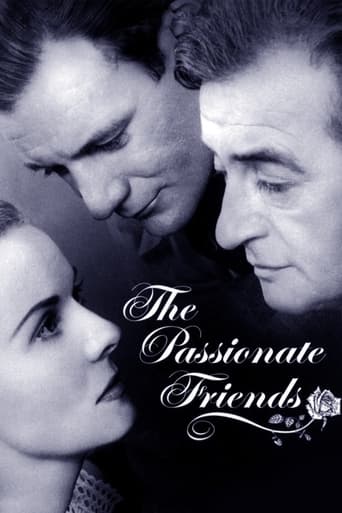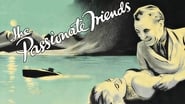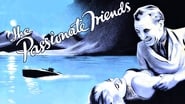hamidrezarafatnejad
You may say that's an old plot, but hand it to David Lean, its going to be fresh as new! Powerful storytelling, masterfully directed. Like Brief Encounter, this too surfs the human soul.
Martin Bradley
This David Lean romance seems to have been swept under the carpet and yet it may be his most underrated masterpiece, (it's infinitely preferable to such elephantine fare as "Ryan's Daughter" and "Doctor Zhivago"). It marked the first time Lean would abandon the studio for more exotic locations, (in this case, the Swiss Alps), and seems designed as a vehicle for his wife, Ann Todd, who is outstanding as the respectable English wife who dallies with an old flame who happens to check into the room next door at the hotel she's staying in while on holiday. He's Trevor Howard and it's as if this is what might have happened in "Brief Encounter" had the lovers a bit more chutzpah.Howard, too, is superb, (he always was; he remains one of the most underrated of all the great actors), and Todd's husband is the consistently excellent Claude Rains at his very best. As a tale of a genteel marriage threatened by genteel adultery it's beautifully done and why it isn't more highly appreciated is something of a mystery. If, like me, you believe Lean to be one of the great directors then this is essential viewing.
robert-temple-1
This film is one of the highest peaks of David Lean's achievement as a director, and possibly it owes something to the fact that he married its star Ann Todd in the same year, which may have helped him elicit her supernaturally radiant performance. Four years earlier, Lean had made 'Brief Encounter', but this film, again with Trevor Howard as the romantic male lead, far exceeds the earlier work in subtlety and genius. Every frame is lovingly composed, and the film is a cinematic masterpiece which can stand beside any Visconti work for comparison. Three future directors worked on the film: Ronnie Neame as producer, Guy Green as Cinematographer, Clive Donner as an editor. There were three editors, and whoever was responsible for it, the final editing is a work of the highest genius. The cinematography by Guy Green and camera operating by Ossie Morris are as good as they get. Everything combined to make this film a triumph and a true work of art. The three stars, Trevor Howard, Ann Todd, and Claude Rains, all excel themselves as they enact this intimate study of a love trio, as if we were standing invisibly beside them and could see it happening, without their being aware of our presence. The tale is drawn from a novel by H. G. Wells. The novel was made into a silent film in 1922 by the famous British director, Maurice Elvey, but it is doubtful that a print of it survives, and I have never heard of anyone who ever saw it. Eric Ambler wrote the screenplay for the Lean version, with immense subtlety. The only one of the three main characters who does not have a major character flaw is Trevor Howard, who is the unfortunate emotional victim of the other two. Ann Todd's character flaw is like an invisible crack in a Ming vase: you can't see it, but the value is immeasurably lowered, as she keeps trying to warn Howard, who cannot believe it: 'My love is not worth much,' she says, and he does not hear her. She has running through her the most abject streak of cowardice, nearly impossible to detect except in extremis, but which reduces her to the status of what one would find for sale at a discount in a cracked china shop. (There used to be such a shop in the King's Road in Chelsea.) Ann Todd shines and is deeply loving and 'true', but repeatedly collapses at the crucial moment and betrays herself every time. This film should really be shown to psychology students (that is, if they could stop studying rats and take an interest in humans). Claude Rains's character flaw is a total denial of love and feeling, as he is convinced he can live without them, that they are unnecessary indulgence. Well, you can imagine the complications. Or perhaps you can't. Better to see the film. In fact, everyone should see this film who has any sensitivity, while those without sensitivity should avoid it, as they will not understand a single thing. What is evanescent is invisible to those with dull inner sight. Psychologically speaking, we have here the intricate elucidation of an invisible character flaw in a woman who appears perfectly normal, warm, glowing, and delightful. Ann Todd's performance is perfectly judged, as it is the very invisibility of her flaw that provides the emotional shock value for the film, and its importance as a lesson to us in human imperfections.
Steffi_P
For The Passionate Friends David Lean treads similar ground as he does in his masterpiece, Brief Encounter, although here the source material is an HG Wells story as opposed to a Noel Coward play.The post-war Lean, with his attention to psychology and emotions, handled these stories of problematic romance brilliantly, and The Passionate Friends is a great example. We open with clouds and snow-capped mountains, a holiday location that foreshadows Lean's Summertime (1955), straight away giving us a sense of dreaminess and soaring emotions.This is Lean at his most psychological and expressionist. The sound and imagery is always calculated to mirror feelings – like the abruptness of the plane wheel touching the ground when Claude Rains returns from his trip abroad. The acting really supports this too. Considering it's a story about a love triangle, a large amount of the story is told through scenes in which one of the three principal characters is alone, or at least unobserved, and the actors convey inner thoughts through subtle expressions and gestures.Also, like the bulk of Lean's pictures from this era there are references to the war and the impact it had on British society. It's probably no coincidence that the decision was made to set the flashbacks of the affair in 1939 (Wells' original story was decades older), the year that war broke out. The cold, bureaucratic Claude Rains seems to be in part symbolic of the necessity in wartime to be rational and emotionless, and the story is an allegory for the need to break away from that.While it is a good story and very well-made, The Passionate Friends is unfortunately no Brief Encounter. On the acting side, Claude Rains is brilliant as always, but I'm less convinced by Ann Todd, who perhaps got the part more because she was Mrs Lean that for her talent. The plot can be a bit confusing with its flashbacks within flashbacks. Probably the biggest problem though is that we never get to totally empathise with the characters. While Brief Encounter's sheer ordinariness made it so universal, you don't get this to the same degree here, and that makes it by far the weaker of the two pictures. Still, it's by no means a disaster, and still one of the better films of David Lean's 1940s output.





